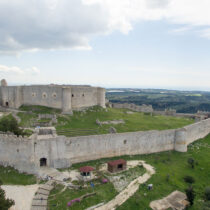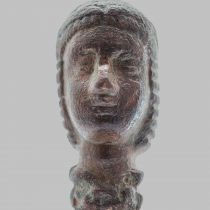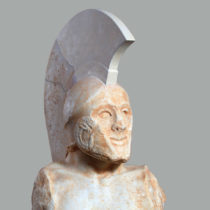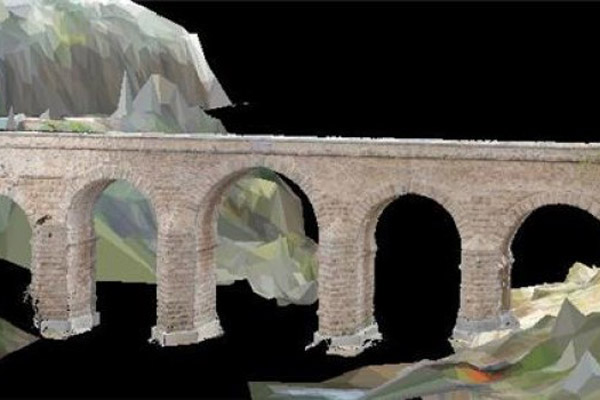Colonies and coins from the Alpha Bank Collection
Jointly organized by the Archaeological Museum of Thessaloniki and the Alpha Bank Numismatic Collection.
Revealing the Secrets of 4,000 Year-Old Settlements in Hungary
Polish archaeologists have studied three settlements in the region of Kakucs, Hungary.
New evidence about the deceased of the royal tomb II at Vergina
Announcement at the Archaeological Conference about the 2013 excavations in Macedonia and Thrace
The Warrior’s Weapons
The statues, of which 8,000 have been revealed so far, were carrying weapons, "wielded" lances, swords and crossbows.
Sutton Hoo-Related Royal Residence Found?
The 50-hectare (123.5-acre) site, four miles north-east of Sutton Hoo contained fragments of exquisite gold jewellery, pieces of gilt bronze horse harness, Saxon pennies and metal offcuts from a blacksmith's workshop and weights associated with trade.
Emotional Expressions in Ancient Funerary Art Served as Therapy for the Bereaved
Emotional expressions on Greek tombstones from the Hellenistic period (323-31 B.C.) help increase our understanding of social communication and cultural values.
Depots of Leiden archaeologists in Syria plundered
From dozens to hundreds of boxes containing remarkable archaeological finds by Leiden researchers in Syria have most probably been plundered.
Mongol Empire Rode Wave of Mild Climate
Tree rings within Siberian pines from the Khangai Mountains exhibit that the years preceding Genghis Khan's rule ( 1180 to 1190) were stoked by intense drought while during the empire's meteoric rise (1211-1225) Mongolia saw sustained rainfall and mild warmth never seen before or since.
10th anniversary of the Minoan Seminar series
Special seminar on the occasion of the 10th anniversary of the Minoan Seminar series will be held on Thursday, March 13th, 2014 at 6.30 p.m., at the Archaeological Society (Panepistimiou 22, Athens). The event will be chaired by Efi Sapouna-Sakellaraki
Leading Ladies: Identifying Women’s Activity in the Ancient World
Call for papers exploring insights on the lives of women who evidently served as leaders or on the developement and dymamics of female leadership in primarily male-led societies.
News On The Dartmoor Burial
The site's location, the vast amount of organic material, and the many "uniques" seen within the burial are what make the discovery so important.
Karabournaki 2013
Announcement at the Archaeological Conference about the Excavations 2013 in Macedonia and Thrace.
Statue of Princess Found in Kom el-Hetan
The statue is 1.7 m. high, bearing the princess' name and titles inscribed near her feet
Enhancement and Management of Cultural Heritage (Part 1)
Examples of sites that combine natural wealth and wealth in monuments in Attica. Proposals of their management and protection.
The Book of Flying Cats
An illustrated 16th century manuscript which was recently digitized by the University of Pennsylvania depicts cats, nirds and other animals strapped with missiles and rocketing against castles.
Work of the School 2013 and Rupestral Inscriptions in the Greek World
The Athens Open Meeting of the ASCSA will take place on March 14, 2014.
Towards the Conservation of the Unique Wooden Sarcophagus From Phaliro
There was an unanimous agreement regarding the first stage of the sarcophagus' conservation procedure.
The Gaugamela campaign
The Netherlands Institute at Athens is organizing a Dialogos lecture by Kleanthis Zouboulakis (PhD Candidate of Ancient History, University of Athens).
Beyond Pompeii
An archaeological project exploring the teritories spreading along Vesuvius' northern slope has brought to light impressive finds revealing delails on life beyond Pompeii.
A.B. Fromm, V. Golding, P.B. Rekdal (eds.), Museums and Truth
The International Committee for Museums of Ethnography (ICME) an international committee of the International Council of Museums (ICOM) is proud to announce a new book.
We Are Museums
We Are Museums is a 2-day event for professionals of cultural institutions who believe in the power of creativity to open museums.




























